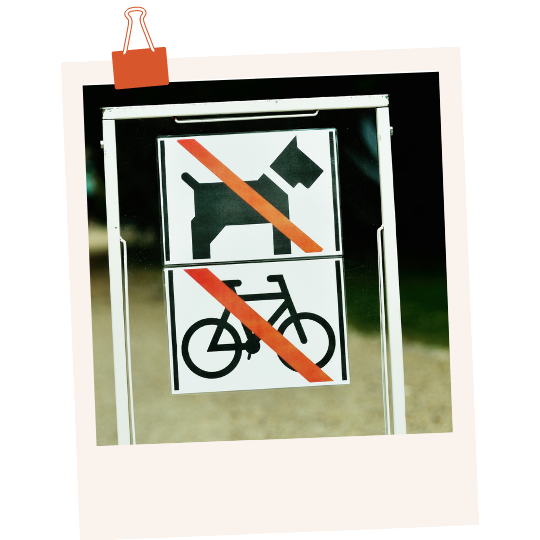Being a sustainable tourist is being a responsible tourist. Sustainability is to balance economic and social development with environmental preservation. To travel consciously is to respect the inhabitant. It is to preserve the local heritage and culture. It is caring for our beloved planet, using its resources conscientiously, ensuring that the next generations also will have the right to enjoy it. It is avoiding waste, to prevent the extermination of what is life.
So you want to know if you are a sustainable tourist? If you identify with at least 5 of the 7 items below, you are already on your way.
1. Respects Sign forbidden to enter

You know that you are no more special than other people, to the point of breaking rules. You know that your dog is not a human being, your bicycle is not part of your body.
You are aware that specific ski area is not only forbidden for “others”, and free for you. That preserved area of the forest, is not preserved for you to enjoy alone. The prohibition of bathing in certain parts of the sea is for you too. Your car is not extraordinary and can enter anywhere, even restricted ones.
When you see any forbidden sign, you respect it. You know it is there for some reason.
When you accept, it doesn’t create an imbalance with a selfish and arrogant posture.
2. Does not go by car to mass tourism destinations
You know that if you drive to that destination, you will spend hours and hours stuck in a giant traffic jam to get there, and you don’t want that.
You also know that it is much more enjoyable to enjoy your holiday without depending on the car, without having to look for parking in disputed places, and you don’t want to spend much of your holiday in traffic jams.
You prefer to get to your destination with a public transport and explore it on foot or by bike.
This way you will lose a few extra kilos in the holidays!

3. Valuing local tourism
It knows that the air transport sector is responsible for a large part of the world’s pollutant emissions and therefore avoids it as much as it can seek alternatives that can be achieved with other means of transport.
The greater the distance, the greater the pollution. Approximately 80% of the CO2 emitted during air travel comes from flights over 1,500 kilometres away.
It is also good for the local economy to exploit tourism itself.
Note: I am not telling you to never travel by plane and not to know other cultures and countries. It would be hypocrisy to come from a nomadic Soul who travels the world, right? But do it as little as possible and explore more of the places you can go without a plane. I do it. The train is my favorite transport.
4. Leave what belongs to the sea on the beach

The empty shells on the sand of the beach, once sheltered living beings, served as protective shells for them. Without the animals, they continue to play an important role in the balance of the environment and the ecosystem.
They serve to promote the stability of the marine environment, they serve as nesting materials for birds, as a substrate for marine plants.
The removal of shells from the beach has caused environmental impact in many parts of the world:
The decrease of organisms and beings that depend on shells, increased erosion on beaches, preventing the reuse of calcium carbonate by marine life.
5. Leaves no light on, no AC and not heater on
It knows that the energy consumed is reflected in the carbon footprint and affects the well-being of the planet. So it is concerned to check that when it leaves the place where it is hosted it has left everything off.
He knows that he must act consciously, because many of these routine details, if not careful, end up generating atmospheric emissions of greenhouse gases.
Imagine the disaster for the environment if all the tourists in the world leave lights on, air conditioners and heaters on.
6. Prefer smaller hotels than Resorts
A resort can bring negative aspects to the community where it is located. Examples are the damage caused by waste disposal, ecosystem change, water and energy waste.
You think about how much these plastic-packed amenities offered in hotel bathrooms are an unnecessary waste.
You don’t like “all-inclusive” because it keeps you in the hotel and prevents you from visiting restaurants, bars, local cafés.
You want to enjoy a local experience and feel that he has made a good choice with the most ecological accommodation.

7. Leaves no rubbish where you visit
Never leave a piece of paper that is out of the trash from where you are visiting.
Reuse bottles and bags, and thus avoid polluting the environment with plastic waste.
Take your own water bottle whenever possible and look for places to refill it.
You are always with your Ecobag, because you may find something you want to buy and do not want to waste with packaging. It can also help you to carry any rubbish until you find a place to dispose of it.
So, have you fully identified yourself? Any other tips? Leave a comment!













4 Responses